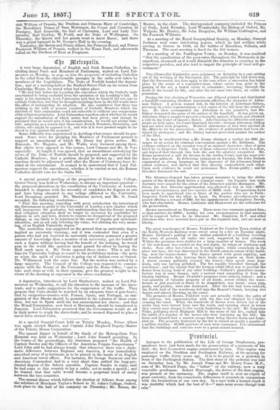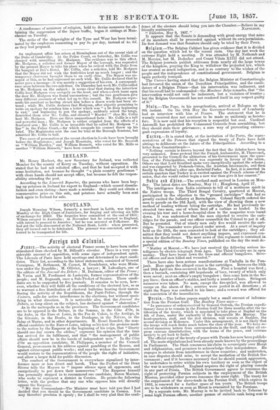Vrottiuriul.
Apropos to the publication of the Life of George Stephenson, preparations have just been made for the preservation of a memento of his skill—the first locomotive engine constructed by him. This engine was employed on the Stockton and Darlington Railway, at its opening for passenger traffic thirty years ago. It is to be placed on a pedestal in front of the Darlington station. The first stone of the pedestal was laid on Saturday last, by Mr. Joseph Pease and Mr. Henry Pease M.P., sons of Mr. Edward Pease the " father " of the railway, now a very venerable gentleman. Robert Murrough, the driver of the first engine, was present at the ceremony. The engine itself is now an object of great curiosity, from the remarkable differences it presents in comparison with the locomotives of our own day. In a race with a horsed coach it was doubtful which had the best of it—" mats nous evens change tout eels." A conference of ministers of religion, held to devise measures for obtaining the suppression of the liquor traffic, began it sittings at Manchester on Tuesday.
The strike of the shipwrights of the Tyne and Wear has been terminated by the employers consenting to pay 58. per day, instead of 4s. 6d. as they had proposed.
An unpleasant affair has arisen at Birmingham out of the recent visit of the Duke of Cambridge. At the Police Court, on Saturday, Mr. Collis was charged with assaulting Mr. Hodgson. The evidence was to this effect. Mr. Hodgson, a solicitor and former Mayor of the borough, was requested by the present Mayor to take his place when he retired with the Duke from The banquet at Dee's Hotel. Mr. Collis, also a solicitor, told Mr. Hodgson that the Mayor did not wish the festivities kept up much longer ; and the temporary chairman brought them to an early close. The Mayor was annoyed at this, as he had expressed no such wish. Mr. Collis declared that he never gave a message—it was merely a suggestion of his own. A correspondence arose between the two solicitors. On Thursday last week Mr. Collie called on Mr. Hodgson on the subject : it seems clear that during the interview 'Collis heat Hodgson very savagely on the head, and when a clerk burst open -the door Mr. Hodgson was found unconscious ; but the two gentlemen give very different accounts of what led up to this assault. Mr. Hodgson represents his assailant as having struck him before a dozen words had been uttered ; while Mr. Collis declares that Hodgson, after abjectly promising to write an apology for sending him a letter which was " a lie from beginning to end," and beginning to pen the apology, suddenly seized the tongs, 4lomished them over Mr. Collis, and shouted " Murder !" then Mr. Collis beat Mr. Hodgson. Here are three unquestioned facts : Mr. Collis is a tall and powerful man ; Mr. Hodgson is rather crippled from the effects of a fractured arm ; Mr. Collis is so irrascible that be called Mr. Hodgson " a liar" in the Police Court,—for which escapade his counsel threw up his brief. The Magistrates sent the case for trial at the Borough Sessions, but admitted Mr. Collis to bail.
Two cases of personation at the recent election in Leeds have been brought before the Magistrates ; and Joseph Mountain, who voted for Mr. Beecroft " William Hiutley," and William Bennett, who voted for Mr. Mills as another "William Bennett," have been committed.
IRELAND.
Mr. Henry Herbert, the new Secretary for Ireland, was reelected Member for the county of Kerry on Tuesday, without opposition. He stated that he had not solicited office, and that he had accepted it with some hesitation, not because he thought "a plain country gentleman" -with clean hands should not accept office, but because he felt the responsibility attending the post.
According to the Limerick _Reporter, the persons who have been buying up potatoes in Ireland for export to England—which caused dissatisfaction and even rioting—have made a mistake : they could not obtain a remunerative price on this side, and potatoes have actually been sent back again to Ireland for sale.
SCOTLAND.
Joseph Manning Wilson, formerly a merchant in Leith, was tried on Monday at the High Court of Justiciary, for forging and uttering six bills of exchange for 2346/. The forgeries were committed at the end of 1865; Wilson escaped to Australia ; in November last he returned to England, with intent to proceed to America; but he was arrested at Folkstone. He had got the bills discounted at the National Bank, Leith : when presented, they all turned out to be fabricated. The prisoner was convicted, and sentenced to be transported for life.



























 Previous page
Previous page